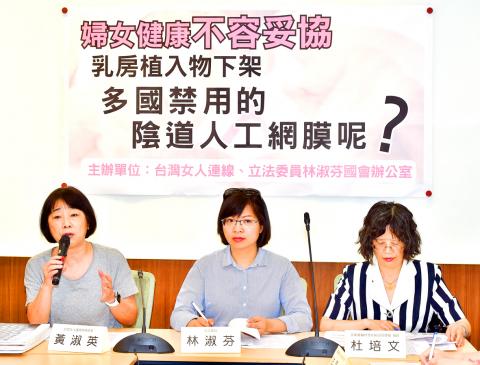Democratic Progressive Party Legislator Lin Shu-fen (林淑芬) and Women’s Link founder Huang Sue-ying (黃淑英) yesterday called on the government to ban transvaginal mesh implants and establish a registry system for medical implants.
Transvaginal mesh implants are used to repair weakened or damaged tissue in women’s bladder or pelvic areas, usually in cases of pelvic organ prolapse (POP) or stress urinary incontinence (SUI).
The US Food and Drug Administration (FDA) cleared the first surgical mesh product specifically for use in SUI cases in 1996 and for POP cases in 2002.

Photo: Tu Chien-jung, Taipei Times
However, complications including chronic pain, vaginal bleeding or discharge, pain during intercourse, urinary problems and exposure of the mesh through the vagina have been reported in many nations, triggering lawsuits in several countries.
New Zealand and Australia last year banned the use of the implants, while the UK enacted a temporary ban, and in April, the FDA ordered manufacturers to immediately stop selling and distributing surgical mesh for anterior compartment prolapse repair, citing safety concerns, Huang told a news conference at the Legislative Yuan in Taipei.
“Compared with the proactive measures taken in other nations, Taiwan is still silent on the issue,” she said.
The Ministry of Health and Welfare only changed the classification of transvaginal mesh to a third-class “high-risk” medical device in July 2017, requiring manufacturers to submit a safety report on their products every six months, Huang said.
“The government is very irresponsible. Its relaxed attitude toward regulating the manufacturers, neglecting the health risks to women who have had such implant surgery,” Lin said.
Reports of complications associated with transvaginal meshes in Taiwan increased from 59 cases in 2013 to 303 cases in 2017, and some patients might not even be aware that their discomfort could be the result of complications caused by the implants, she said.
The government needs to establish a medical implant registry system, and require that patients be informed about the possible risks associated with transvaginal meshes before having such surgeries.
Food and Drug Administration section chief Tu Pei-weng (杜培文) said the agency was aware of international safety warnings about the products and had adjusted the risk management measures on such implants.
However, a meeting of specialists that the agency held in March suggested that the reported problems in Taiwan stemming from such procedures were more due to physicians’ training and patient screening than with the products, she said.
The specialists at the meeting said that banning the use of transvaginal mesh implants would hurt women with SUI or POP, as there is no better alternative treatment, Tu said.
Given patient personal data protection regulations, registry systems are usually voluntary, not compulsory, she said.
An amendment to the Regulations for Governing the Management of Medical Devices (醫療器材管理法) that is under review at the Legislative Yuan would require the tracking of high-risk medical devices from the manufacturers, Taiwan’s Food and Drug Administration said.

Chinese Nationalist Party (KMT) Chairman Eric Chu (朱立倫), spokeswoman Yang Chih-yu (楊智伃) and Legislator Hsieh Lung-chieh (謝龍介) would be summoned by police for questioning for leading an illegal assembly on Thursday evening last week, Minister of the Interior Liu Shyh-fang (劉世芳) said today. The three KMT officials led an assembly outside the Taipei City Prosecutors’ Office, a restricted area where public assembly is not allowed, protesting the questioning of several KMT staff and searches of KMT headquarters and offices in a recall petition forgery case. Chu, Yang and Hsieh are all suspected of contravening the Assembly and Parade Act (集會遊行法) by holding

PRAISE: Japanese visitor Takashi Kubota said the Taiwanese temple architecture images showcased in the AI Art Gallery were the most impressive displays he saw Taiwan does not have an official pavilion at the World Expo in Osaka, Japan, because of its diplomatic predicament, but the government-backed Tech World pavilion is drawing interest with its unique recreations of works by Taiwanese artists. The pavilion features an artificial intelligence (AI)-based art gallery showcasing works of famous Taiwanese artists from the Japanese colonial period using innovative technologies. Among its main simulated displays are Eastern gouache paintings by Chen Chin (陳進), Lin Yu-shan (林玉山) and Kuo Hsueh-hu (郭雪湖), who were the three young Taiwanese painters selected for the East Asian Painting exhibition in 1927. Gouache is a water-based

Taiwan would welcome the return of Honduras as a diplomatic ally if its next president decides to make such a move, Minister of Foreign Affairs Lin Chia-lung (林佳龍) said yesterday. “Of course, we would welcome Honduras if they want to restore diplomatic ties with Taiwan after their elections,” Lin said at a meeting of the legislature’s Foreign Affairs and National Defense Committee, when asked to comment on statements made by two of the three Honduran presidential candidates during the presidential campaign in the Central American country. Taiwan is paying close attention to the region as a whole in the wake of a

OFF-TARGET: More than 30,000 participants were expected to take part in the Games next month, but only 6,550 foreign and 19,400 Taiwanese athletes have registered Taipei city councilors yesterday blasted the organizers of next month’s World Masters Games over sudden timetable and venue changes, which they said have caused thousands of participants to back out of the international sporting event, among other organizational issues. They also cited visa delays and political interference by China as reasons many foreign athletes are requesting refunds for the event, to be held from May 17 to 30. Jointly organized by the Taipei and New Taipei City governments, the games have been rocked by numerous controversies since preparations began in 2020. Taipei City Councilor Lin Yen-feng (林延鳳) said yesterday that new measures by